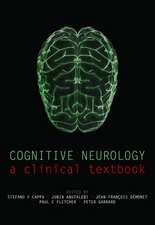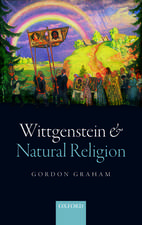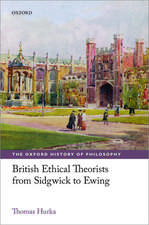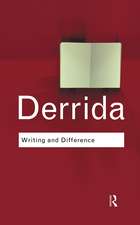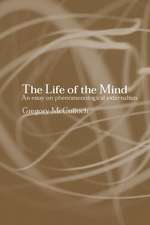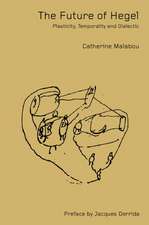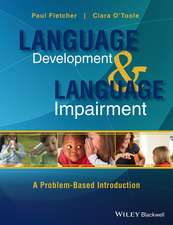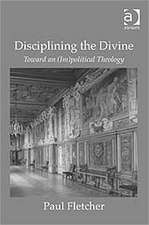The Messianic Now: Philosophy, Religion, Culture
Editat de Arthur Bradley, Paul Fletcheren Limba Engleză Paperback – 14 oct 2024
| Toate formatele și edițiile | Preț | Express |
|---|---|---|
| Paperback (1) | 258.91 lei 6-8 săpt. | |
| Taylor & Francis – 14 oct 2024 | 258.91 lei 6-8 săpt. | |
| Hardback (1) | 498.88 lei 6-8 săpt. | |
| Taylor & Francis – 14 feb 2011 | 498.88 lei 6-8 săpt. |
Preț: 258.91 lei
Preț vechi: 303.32 lei
-15% Nou
Puncte Express: 388
Preț estimativ în valută:
49.56€ • 53.85$ • 41.66£
49.56€ • 53.85$ • 41.66£
Carte tipărită la comandă
Livrare economică 21 aprilie-05 mai
Preluare comenzi: 021 569.72.76
Specificații
ISBN-13: 9781032927138
ISBN-10: 1032927135
Pagini: 214
Dimensiuni: 174 x 246 mm
Greutate: 0.4 kg
Ediția:1
Editura: Taylor & Francis
Colecția Routledge
Locul publicării:Oxford, United Kingdom
ISBN-10: 1032927135
Pagini: 214
Dimensiuni: 174 x 246 mm
Greutate: 0.4 kg
Ediția:1
Editura: Taylor & Francis
Colecția Routledge
Locul publicării:Oxford, United Kingdom
Public țintă
Academic and PostgraduateCuprins
Acknowledgements Arthur Bradley 1. Introduction: On a Newly Arisen Messianic Tone in Philosophy Arthur Bradley and Paul Fletcher 2. The Apostate Messiah: Scholem, Taubes and the Occlusions of Sabbatai Zevi Howard Caygill 3. Locating the Messianic: In Search of Causation and Benjamin’s Last Message Eric Jacobson 4. Levinas’s Weak Messianism in Time and Flesh, or The Insistence of Messiah Ben David Bettina Bergo 5. Tarrying with the Apocalypse: The Wary Messianism of Rosenzweig and Levinas Agata Bielik-Robson 6. The Messianic Idea, the Time of Capital and the Everyday William Large 7. Impersonal Speech: Blanchot, Virno, Messianism Lars Iyer 8. Time, Language and the Destruction of Power Franson Manjali 9. Two Versions of Islam and the Apocalypse: The Persistence of Eschatology in Schlegel, Baudrillard and Žižek Ian Almond 10. Left Behind: The Messianic without Sovereignty Jeffrey W. Robbins 11. Redemptive Remnants: Agamben’s Human Messianism Patrick O’Connor 12. Why the People To Come Will Not, and Must Not, Be Sovereign: Notes on a Political and Mathematical Puzzle Soumyabrata Choudhury 13. The Long Take: Messianic Time in Andrei Tarkovsky’s Nostalghia Gerard Loughlin
Notă biografică
Arthur Bradley is Senior Lecturer in Literary and Cultural Studies at Lancaster University. He is the author of Negative Theology and Modern French Philosophy (2004); Derrida's Of Grammatology: A Philosophical Guide (2008) and has co-edited (with Paul Fletcher) a collection of essays entitled The Politics to Come (2010). In 2010, he published (with Andrew Tate) a monograph entitled The New Atheist Novel: Fiction, Philosophy and Polemic after 9/11.
Paul Fletcher (1965-2008) was Lecturer in Religious Studies at Lancaster University. He is the author of Disciplining the Divine: Toward an (Im)political Theology (2009) and co-editor (with Arthur Bradley) of the edited collection The Politics to Come (2010).
Paul Fletcher (1965-2008) was Lecturer in Religious Studies at Lancaster University. He is the author of Disciplining the Divine: Toward an (Im)political Theology (2009) and co-editor (with Arthur Bradley) of the edited collection The Politics to Come (2010).
Descriere
This is the first comprehensive examination of the implications of the messianic turn within contemporary thought. It will be of appeal to students and scholars working in the fields of cultural studies; philosophy; religious studies; politics and international relations and literary studies. This book was published as a special issue of the

